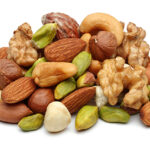KEEP GOOD CARBS AND CARRY ON
GET CRACKING
Nuts are popular nibbles that pack a nutritional punch with their protein, fibre, unsaturated fats, vitamins, minerals, trace elements and phytochemicals. As a bonus, they are also rich in substances considered protective for the heart: an amino acid (building block of protein) called arginine; vitamin E, folate, copper (a mineral) and plant sterols. Did you know studies show that:
- Enjoying a handful of nuts 5–7 times a week can halve your risk of developing heart disease. Even people who eat nuts once a week have less heart disease than those who don’t eat any nuts. How come? It’s possible the unique combination of healthy fats, fibre, antioxidants, arginine and plant sterols all working together give nuts their heart healthy benefits.
- The arginine in nuts helps insulin work more effectively. It can also improve the overall health of blood vessels, helping prevent complications of diabetes.
What about peanuts and nut allergy? Processed peanuts are quality-controlled for the presence of fungus that produces a toxin called aflatoxin. Because peanuts in the shell are not screened, throw away any mouldy ones. Peanut allergy is an increasingly common food allergy especially in children. One-third of all peanut-allergic people are also allergic to tree nuts such as brazil nuts, hazelnuts, walnuts, almonds, macadamia nuts, pistachios, pecans, pine nuts and cashews.
What about blood glucose? Most nuts contain relatively little carbohydrate which is why they either don’t have a GI or have a very low GI and will have negligible impact on blood glucose. In fact, nuts can reduce the GI of starchy foods eaten with them in a mixed meal. For example if you eat nut butter on a slice of high GI fluffy white bread the overall GI of the sandwich will be lower.
What about activated almonds? Dietitian Nicole Senior explains: “Essentially, activated almonds are soaked overnight, rinsed and slow roasted on a low heat for several hours. Enthusiasts say this process deactivates enzyme inhibitors in the outer layer making the almonds more digestible and their nutrients more available. Looking at the science it becomes clear this is more a good story to justify charging a lot more money for them. Enjoy them by all means but I think I’ll stick to the regular lazy almonds.”
Are cakes made with almond meal better for you? Nicole Senior says: “Making cakes with almond meal gives a delightful moist texture and great flavour, and that’s a great reason to use it. Using almond meal instead of flour also adds fibre and good fats, and allows cakes to be gluten-free which is good news for those with celiac disease. Make an almond meal cake even healthier by adding fruit (citrus is divine) and using oil instead of butter.”
10 tasty ways to get more nuts into your day
- Sprinkle nuts over wholegrain breakfast cereal or porridge
- Toss cashews through a stir fry
- Roast nuts and toss through a salad
- Chop walnuts or Brazils and add to a dipping sauce
- Crumble pecans into yoghurt and serve with fruit
- Sprinkle chopped, roasted hazelnuts or almonds over low-fat ice cream
- Top grilled fish with a nutty crumble
- Add roasted pine nuts to pasta dishes
- Blend pistachios or macadamias with fresh herbs, parmesan and a little olive oil for pesto
- Partner sweet potato, beetroot, pumpkin, baby spinach, avocado and mango with roasted macadamias








